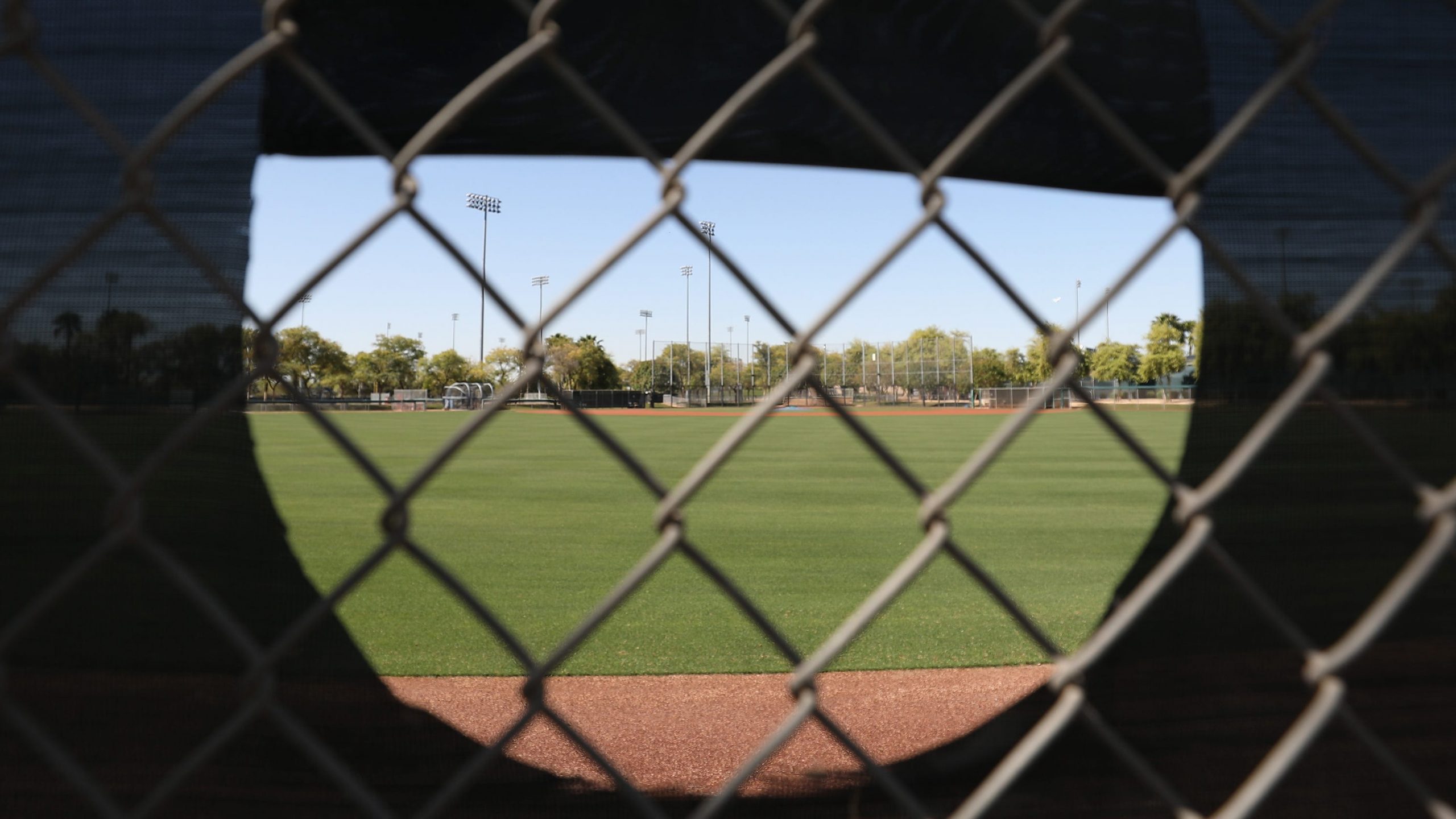There will be a time for optimistic plans and audacious hopes.
Now is not it, however.
On the same day the PGA Tour released its revamped schedule for the majors, a scenario was floated Monday night that would allow Major League Baseball to start its season as early as May by sequestering players at stadiums in Arizona. The NBA, meanwhile, was reported to be assessing rapid COVID-19 tests, a sign it too, is looking for ways to speed its return.
And not one of those is achievable. Not in the foreseeable future, anyway.
Playing the Major League Baseball season at spring training stadiums in Arizona in the middle of a pandemic sends a dangerous message, according to public health experts. (Photo: Christian Petersen, Getty Images)
“Every epidemic is surrounded by false and wrong and counterproductive messages. We actually call those (messages) misinformation of myths and mischief,” said Gary Slutkin, a professor of epidemiology and international health at the University of Illinois-Chicago who has worked on epidemics including tuberculosis, cholera, AIDS and Ebola for 30 years.
“I don’t think (this is) mischief, I just think it’s false hopes. And wishful thinking,” added Slutkin, who is a senior adviser to the World Health Organization. “But it is counter-productive to what we need to do.”
We all desperately want sports back. They are our greatest unifier and our best distraction. Short of that, we want the promise of their return, a date or time frame that we can cling to for when life will be back to normal.
NIGHTNEGALE: MLB's crazy Arizona 2020 plan could have terrible consequences
But we’re not there yet. Not even close, what with 380,000 cases and counting in the United States and almost 12,000 deaths, and no vaccine or treatment options proven to be effective. To float these trial balloons – which was exactly what the MLB and NBA stories were – distorts perspective and tricks people into thinking they can relax their guards.
“I think it’s a harmful symbol that we can get back to normal, everything is safe,” said Lawrence Gostin, director of the WHO’s Collaborating Center on Public Health Law & Human Rights. “It could have a cascading effect that would place more at risk. (The general public) would (see a PGA event and) go out and play golf. And they would think, 'Oh, we’ll just go have lunch before we play golf.'
“Sports stars are role models,” Gostin added, “and they have to model the best-possible behavior based upon science.”
And if the ideas were planted to placate President Donald Trump, who thinks he knows better than health experts when life can return to normal and who only two days earlier had a call with the PGA Tour, MLB and NBA commissioners, among others, well that’s just shameful.
The truth is, the experts predict we have several more weeks – at least – of sheltering at home still in front of us. We will be even more bored and anxious and stressed out than we already are. The last thing we need is to have our hopes raised when they’ll only be dashed in a few weeks.
Even when isolation does end, we will not magically go back to life as we knew it before COVID-19.
Until there is a vaccine, proven treatments or widespread testing available, until our health care systems have adequate resources to treat those infected and our medical professionals have enough protective equipment, large gatherings of people will be impossible.
“We’re under-realizing what is required to show that anything is safe,” Slutkin said. “And what is required to show that anything is safe is that new cases are rare and that the health department can squash any single new case from spreading further. And no one’s shown that yet.
“It’s doable. It is possible. And some of the pieces of this are showing up in San Francisco and Seattle,” Slutkin added. “But no one’s showing it enough to be able to change to the way that daily life is, and sporting events are a far shot from daily life. They’re basically high-risk spreading situations.”
Slutkin, Gostin and Amir Attaran, an epidemiologist and professor of law and medicine at the University of Ottawa, agreed that golf is probably the sport we can have back first. It’s played outdoors, and players can practice social distancing.
Still, precautions will need to be taken, Slutkin said. If caddies are going to be used, both players would have to have tested negative for COVID-19 or have tested positive for antibodies – not that we have that capability yet.
But the same challenges that exist for playing basketball or baseball games without spectators apply to golf tournaments. To pull it off will require hundreds of additional personnel – television crews, caterers, hotel workers and pilots or drivers, just to name a few. How will they all be kept safe and what happens if one of them is exposed?
“You have to think in a holistic, sophisticated way,” Gostin said. “If you look at organizing any major sporting event before it’s safe, it could have an amplifying effect on the spread of this virus.”
We'll get our sports back someday. But that day remains a ways off, and suggesting otherwise is harmful in many different ways.
Follow USA TODAY Sports columnist Nancy Armour on Twitter @nrarmour.
Source: Read Full Article
